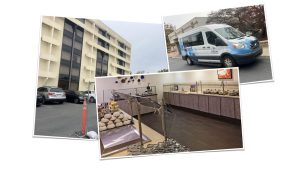On a recent Wednesday morning in a bright green committee room in City Hall, the Durham-Chapel Hill-Carrboro Metropolitan Planning Organization Technical Committee held its monthly meeting to discuss everything from bike lanes to traffic jams.
To most, this meeting would seem like the stuff of mind-numbing bureaucratic nightmares. But not to the group’s chair, Nishith Trivedi, who has been on the committee since 2018.
 “It’s a lot of fun,” he said, despite the fact that the day’s agenda included discussion on bus stop improvements and the approval of a parking study for downtown Hillsborough.
“It’s a lot of fun,” he said, despite the fact that the day’s agenda included discussion on bus stop improvements and the approval of a parking study for downtown Hillsborough.
“I get to see what everyone else is doing, coordinate together, collaborate together, work together in improving the entire transportation network.”
The feds require this —not that members have fun (Trivedi may be unique in that regard) — but that local transportation organizations work together. In this case, that means Durham County, a portion of Orange County, and northeast Chatham County.
The committee’s mission is to screen potential projects and provide advice to the elected officials on the MPO Board.
The first action item on the agenda: approval of five new projects for federal funding, with an opportunity for public comment. It was a good day for bicyclists, as the projects included the development of protected bike lanes on Cameron Avenue in Chapel Hill.
“We have received five comments so far…basically just saying that they were happy that the projects were more broad-based, that there were bike and pedestrian facilities,” member Kelly Fomenko announced.
Other projects can be transformative for the region. According to member Andy Henry, the committee’s input can transform the landscape of the area and the development of local cities.
“There used to be a proposed freeway bypass to go around the northern half of the city of Durham and this committee took that off the long-range plan so that it never got built,” said Henry, who has been on the committee since 2002.
“Had we not done that…north Durham would look completely different. It would be suburbanized,” he added.
The five projects, including the bicycle project, passed unanimously.
Next on the agenda was a presentation on a congestion management process, which sparked a heated debate among representatives over how it would affect federal funding for their areas (a reminder that all politics is local).
The meeting ended with reports from the North Carolina Department of Transportation staff. After the meeting, many members stuck around chatting to each other about work, home, and inevitably, transportation.
The committee, although most likely completely unknown to the common Durhamite, has had large impacts on Durham and the surrounding region.
“Any type of transportation improvement you see [within the area] has most likely come through this committee or started in this committee,” said member Brandon Jones, a division engineer at the North Carolina Department of Transportation.
The importance of the work doesn’t mean the process isn’t slow and bureaucratic, though.
Member Ellen Beckman said that when she started in 2005, the MPO’s top priority was securing funding for the East End Connector, which would link the Durham Freeway and U.S. 70.
The East End Connector opened to traffic this past summer, in June 2022.
Photo at top: The work of the technical committee sometimes takes years to translate into completed highways. A case in point: The East End Connector, shown here at groundbreaking. Photo from North Carolina Department of Transportation.






